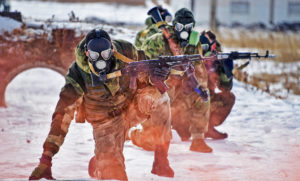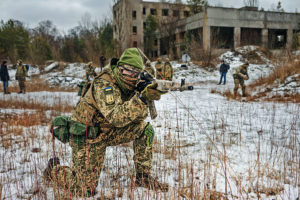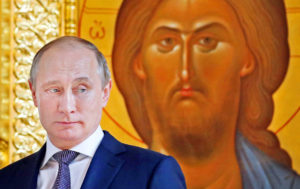Beregsurány, Hungary
At dusk on Hungary’s Beregsurány border crossing with western Ukraine, a small, but constant flow of displaced people was making its way across the border. They were mostly women, children and old men: Ukraine has reportedly banned men of fighting age from leaving the country.
Wheeling their luggage, wrapped up against the biting wind, ethnic Hungarians and Hungarian-speaking Roma from Ukraine’s Zakarpattia region waited to be picked up by family members on the Hungarian side of the border, and ethnic Ukrainians from deeper inside the country were asking for lifts to Budapest.
The Hungarian government has waived visa requirements for Ukrainians fleeing the war, and has indicated it is willing to accept up to 600,000 refugees. But one young couple from Kyiv I spoke to, Olena and Yura, were going the other way. Newly-engaged, they were returning to Ukraine to reassure Olena’s mother in Lviv, after her 50-year-old father had taken up arms with a local defence militia. “My mother was crying,” Olena told me chirpily. “But my father said, ’Who’s going to do it if not us?’”
Four days into the invasion, the Ukrainian armed forces and local volunteers are fighting bravely, defending the capital Kyiv against early Russian infiltration efforts and putting up a dogged defence against Russian pushes from the northeast towards the city of Kharkiv and from the separatist provinces of the Donbas region in the east. But for all the well-meaning excitement on social media from Ukraine’s Western supporters, stoked by video evidence of Ukrainian tactical victories, the strategic odds remain stacked in Russia’s favour.
The air and missile strikes on Ukraine’s defences have, until now, been far below Russia’s potential capabilities, probably indicating that Putin is eager to minimise the destruction and civilian casualties to make a conquered Ukraine easier to dominate, and to limit international condemnation. The Russian push on Kyiv has so far consisted of a high-risk assault by lightly-armed airborne infantry, which established a staging ground for probing movements by elite reconnaissance forces. The Ukrainian defenders have been able to contain their attempted sorties into central Kyiv, inflicting heavy casualties.
But the main Russian ground forces have reached the capital in two armoured thrusts from the north, massing either side of the river Dnieper, with another thrust closing in on the capital from the northeast. Another armoured push is spreading out northward and along the Black Sea coast from the Crimean peninsula, rapidly gaining ground and so far meeting limited resistance.
Perhaps the intention is to encircle the bulk of the Ukrainian army in the east: if there was any Russian ambition to shatter Ukrainian morale in the war’s opening hours, that gambit has failed. Yet Russia has, at the time of writing, deployed less than half of its forces assembled at Ukraine’s borders. It is still too early to make confident pronouncements about the war’s final outcome: we are still in its opening phase, and the real battle for Kyiv has not yet begun.
Viewed from neighbouring Hungary, the Russian invasion has come as a terrible shock to a Fidesz government that has long aimed to balance Nato and EU commitments with a pragmatic working relationship with Putin’s Russia. Only a few weeks ago, in his state of the nation address, Prime Minister Viktor Orbán stated that “we are members of Nato and the European Union, and at the same time we have balanced political and economic relations with Russia. The Hungarian example proves that this is possible,” adding that he was “convinced that without economic cooperation with Russia, Europe will remain weak and anaemic”.
But Russia’s invasion of Ukraine has upset this delicate calculus. In interviews with UnHerd over the past week, senior Hungarian officials emphasised their horror and condemnation of Putin’s actions, and their commitment to both Ukraine’s territorial integrity and Nato’s defence of Central Europe — while still observing that Hungary has long criticised what they view as the repression of Ukraine’s ethnic Hungarian minority. Unlike other Central European nations, Hungary will not actively support Ukraine with weapons supplies or demand an American military presence, but now supports sanctions against Russia. In unequivocal language the Hungarian president János Áder has stated that Hungary condemns “the aggression decided and then carried out by the Putin regime” and that it sees “the Russian attack as a serious violation and a mockery of Moscow’s international obligations”.
Speaking to UnHerd, Orbán’s communications advisor, Zoltan Kovacs, observed that “in the Ukraine, we have an immediate interest because of the 150,000 ethnic Hungarians living across the borders”. Dismissing early claims that Hungary would not accept displaced persons from Ukraine, he emphasised that “we are practically preparing ourselves for all possible scenarios, like the influx of large numbers of refugees, so we’ve started to make preparations for that. And the Hungarian military is preparing for all kinds of scenarios.”
Considering the geopolitical implications, Viktor Orbán’s Political Director and strategic advisor, Balasz Orbán (no relation), told me that this is a turning point for Europe as well as Hungary. “We realise that justice and wonderful ideas are not enough. You can be on the good side of history, but still lose wars and lose geopolitical positions: you need to have power,” he said. “Because right now, the problem is that Europe is not capable of defending herself. And we are dependent on the big guys, the United States on one side and Russia on the other side, and they are the decision makers, if we take it honestly. Without a military, Europe is just a voice accepting statements. It’s just nothing.”
When I asked him if Hungary was moving towards Macron’s concept of strategic autonomy, which would enable Europe to defend itself from threats like Russia, Balasz Orbán answered without hesitation: “Exactly. It’s very important,” he told me. “Emmanuel Macron is a very smart politician and what he is talking about, it’s obviously a French context, but we can deal with that. We have the same idea with a Central European context.”
Certainly, the war in Ukraine has helped Macron make his case for strategic autonomy, with the French president declaring that the Russian invasion “has shown again that we have to accelerate the sovereignty agenda for Europe. Tragic times are back. War is back on our soil. If there was ever any need to prove Europe isn’t just a market for consumers but is a power,” that time is now.
The invasion has also helped diminish the moral and political standing of a Germany that long fought to quash any talk of European strategic autonomy, while waving away warnings that disarmament and reliance on Russian energy have left Europe helpless against any future Russian aggression. In an extraordinary admission, the head of the German Army, Lt. General Alfons Mais, bemoaned on LinkedIn that years of neglect have “left the Bundeswehr more or less powerless”, so that “the Bundeswehr, the army that I am privileged to lead, is more or less bare. The options that we can offer the politicians to support the alliance are extremely limited… This does not feel good! I am pissed off!”
Of course, much the same could be said of Britain’s deep military cuts, though our own military and political leaders are markedly less willing to say it. Indeed, excitable enthusiasts for military intervention such as Tobias Ellwood, chair of the Commons Defence Select Committee, have been trying to drum up enthusiasm for a Nato No-Fly Zone in Ukraine, a euphemism for shooting down Russian aircraft entering Ukrainian territory.
Not to be outdone, David Davis MP has pushed the idea of providing close air support for Ukrainian forces against Russian ground troops, an idea far beyond the bounds of either British capacity or rational analysis. Shooting down Russian aircraft or bombing Russian tanks means war with Russia, and Nato simply will not go to war with its nuclear rival over Ukraine. These are dangerous times for Britain and for Europe as a whole, and such wild pronouncements do not instil confidence in the capacity of the British political system to manage them sensibly.
For all of Europe, from Hungary to Britain, the war in Ukraine must come as a wake-up call. The good times are over, and a return to conflict between the great powers on our home continent is now more likely than it has been in a generation. For a small country like Hungary, watching the prospect of a resurgent Russia creeping its way towards its borders with alarm, the danger is clearly apparent. In his state of the nation address, Orbán observed: “whether a Nato member or not, no ally in the world will take our place in defending our homeland. Alongside us, with us, they might; but certainly not instead of us. If we are not strong enough, Hungary cannot be safe. Clint Eastwood taught us this: if there is a gun nearby, it is best if we are holding it.”
For all the conflict between Brussels and Budapest, it is time for European officials to take this warning to heart. Europe needs to rearm, and to be ready to defend itself alone if necessary. The announcement on Sunday afternoon by Germany’s new Chancellor Olaf Scholz that Germany will double its defence spending is a welcome relief, and hopefully a turning point in European security policy.
The Russian invasion has done much to reinvigorate the Atlantic alliance, but it has also exposed Europe’s utter dependence on US arms at a time when America’s greatest strategic threat is in the Pacific. America cannot, and will not, fight a two-front war in Europe and the Far East: a serious threat to American hegemony in the Pacific will force Europe to shoulder much of the burden for its own defence as Washington’s attention and industrial might focuses on China.
All the earlier appeals to the rules-based order by EU officials have been exposed as dangerously empty rhetoric: in a world of hard power, it is only those capable of imposing order that get to write the rules.
Disclaimer
Some of the posts we share are controversial and we do not necessarily agree with them in the whole extend. Sometimes we agree with the content or part of it but we do not agree with the narration or language. Nevertheless we find them somehow interesting, valuable and/or informative or we share them, because we strongly believe in freedom of speech, free press and journalism. We strongly encourage you to have a critical approach to all the content, do your own research and analysis to build your own opinion.
We would be glad to have your feedback.
Source: UnHerd Read the original article here: https://unherd.com




